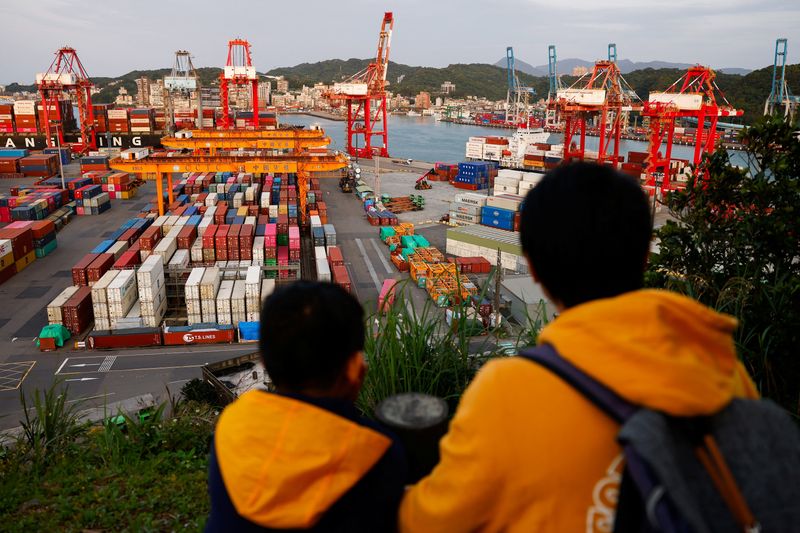fansink
Well-known member
TAIPEI (Reuters) - Taiwan’s President Lai Ching-te on Sunday offered zero tariffs as the basis for talks with the U.S., pledging to remove trade barriers rather than imposing reciprocal measures and saying Taiwanese companies will raise their U.S. investments.
President Donald Trump announced across-the-board import tariffs on Wednesday, with much higher duties for dozens of trading partners, including Taiwan, which runs a large trade surplus with the U.S. and faces a 32% duty on its products.
The U.S. tariffs, however, do not apply to semiconductors, a major Taiwanese export.
In a video message released by his office after meeting executives from small and medium-sized companies at his residence, Lai said given Taiwan’s dependence on trade the economy would inevitably have a hard time dealing with the tariffs, but that he thought the impact could be minimised.
"Tariff negotiations can start with ’zero tariffs’ between Taiwan and the United States, with reference to the U.S.-Canada-Mexico free trade agreement," Lai said.
Taiwan has no plans to take tariff retaliation, and there will be no change in Taiwanese companies’ investment commitments to the United States as long as they are in Taiwan’s interest, he added in comments provided by his office.
Taiwan’s TSMC, the world’s largest contract chipmaker, last month announced an additional $100 billion investment in the U.S.
"In the future, in addition to TSMC’s increased investment, other industries, such as electronics, information and communications, petrochemicals, and natural gas will be able to increase investment in the U.S. and deepen Taiwan-U.S. industrial cooperation," Lai said.
"All purchases will be actively pursued," Lai said.
Non-tariff trade barriers are an indicator for the U.S. to assess the fairness of trade, and Taiwan will proactively resolve non-tariff trade barriers that have existed for many years to make trade negotiations with the U.S. smoother, he added.
The U.S. is Taiwan’s most important international backer and main source of arms, despite the lack of formal diplomatic ties.
Taiwan has faced stepped-up military and political pressure from its giant neighbor China, which views the democratically governed island as Chinese territory, despite the objections of the government in Taipei.
Shortly before Trump’s tariff announcement, China announced the end of its latest round of war games around Taiwan.
Lai said that Taiwan has faced major global crises before and came through those.

"Not only have we been able to overcome the difficulties, but we have also been able to turn crises into opportunities, transforming the Taiwanese economy into a new and more resilient one," he added.
President Donald Trump announced across-the-board import tariffs on Wednesday, with much higher duties for dozens of trading partners, including Taiwan, which runs a large trade surplus with the U.S. and faces a 32% duty on its products.
The U.S. tariffs, however, do not apply to semiconductors, a major Taiwanese export.
In a video message released by his office after meeting executives from small and medium-sized companies at his residence, Lai said given Taiwan’s dependence on trade the economy would inevitably have a hard time dealing with the tariffs, but that he thought the impact could be minimised.
"Tariff negotiations can start with ’zero tariffs’ between Taiwan and the United States, with reference to the U.S.-Canada-Mexico free trade agreement," Lai said.
Taiwan has no plans to take tariff retaliation, and there will be no change in Taiwanese companies’ investment commitments to the United States as long as they are in Taiwan’s interest, he added in comments provided by his office.
Taiwan’s TSMC, the world’s largest contract chipmaker, last month announced an additional $100 billion investment in the U.S.
"In the future, in addition to TSMC’s increased investment, other industries, such as electronics, information and communications, petrochemicals, and natural gas will be able to increase investment in the U.S. and deepen Taiwan-U.S. industrial cooperation," Lai said.
"All purchases will be actively pursued," Lai said.
Non-tariff trade barriers are an indicator for the U.S. to assess the fairness of trade, and Taiwan will proactively resolve non-tariff trade barriers that have existed for many years to make trade negotiations with the U.S. smoother, he added.
The U.S. is Taiwan’s most important international backer and main source of arms, despite the lack of formal diplomatic ties.
Taiwan has faced stepped-up military and political pressure from its giant neighbor China, which views the democratically governed island as Chinese territory, despite the objections of the government in Taipei.
Shortly before Trump’s tariff announcement, China announced the end of its latest round of war games around Taiwan.
Lai said that Taiwan has faced major global crises before and came through those.

"Not only have we been able to overcome the difficulties, but we have also been able to turn crises into opportunities, transforming the Taiwanese economy into a new and more resilient one," he added.
